TRIBUTE
Small-package dynamite – a dedication to photographer Les Bush
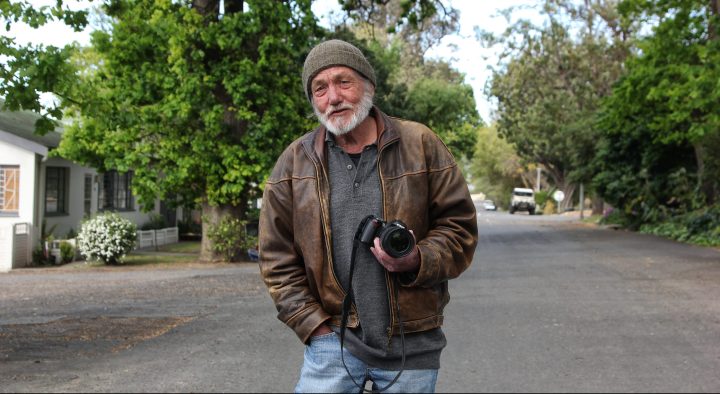
One of South Africa’s most colourful and popular media photographers, Les Bush, has died. Tributes are still flowing in from everywhere.
See the grizzled old guy with the Willie Nelson ponytail, the silver beard and the Nikon walking the streets of Villiersdorp down in the Western Cape. Catch him strolling around the stalls at a weekend village market, or on an outcrop of rocks looking over the ever-changing fortunes of the nearby Theewaterskloof Dam, where Cape Town gets a chunk of its water.
See that guy? That’s my buddy Les Bush. He’s the unofficial Voice of Villiersdorp, promoting his adopted home town with verve, gusto and camera. He’s also surprised us all and become a dab hand at social media.
Buy him a coffee, find a shady spot somewhere quiet and let him tell you a story or two about his 50 rough-and-tumble years of chasing hard news, road adventures, hiking, birding and, these days, being the tourism photographer of Villiersdorp. The man is a real legend.
Remember Scope Magazine?
Allow me to warm you up with a few Bush tales of my own, going back to the good old bad old days of Scope Magazine right up to his life in this renowned fruit and wine (and, lately, alpaca farming) town in the Overberg region.
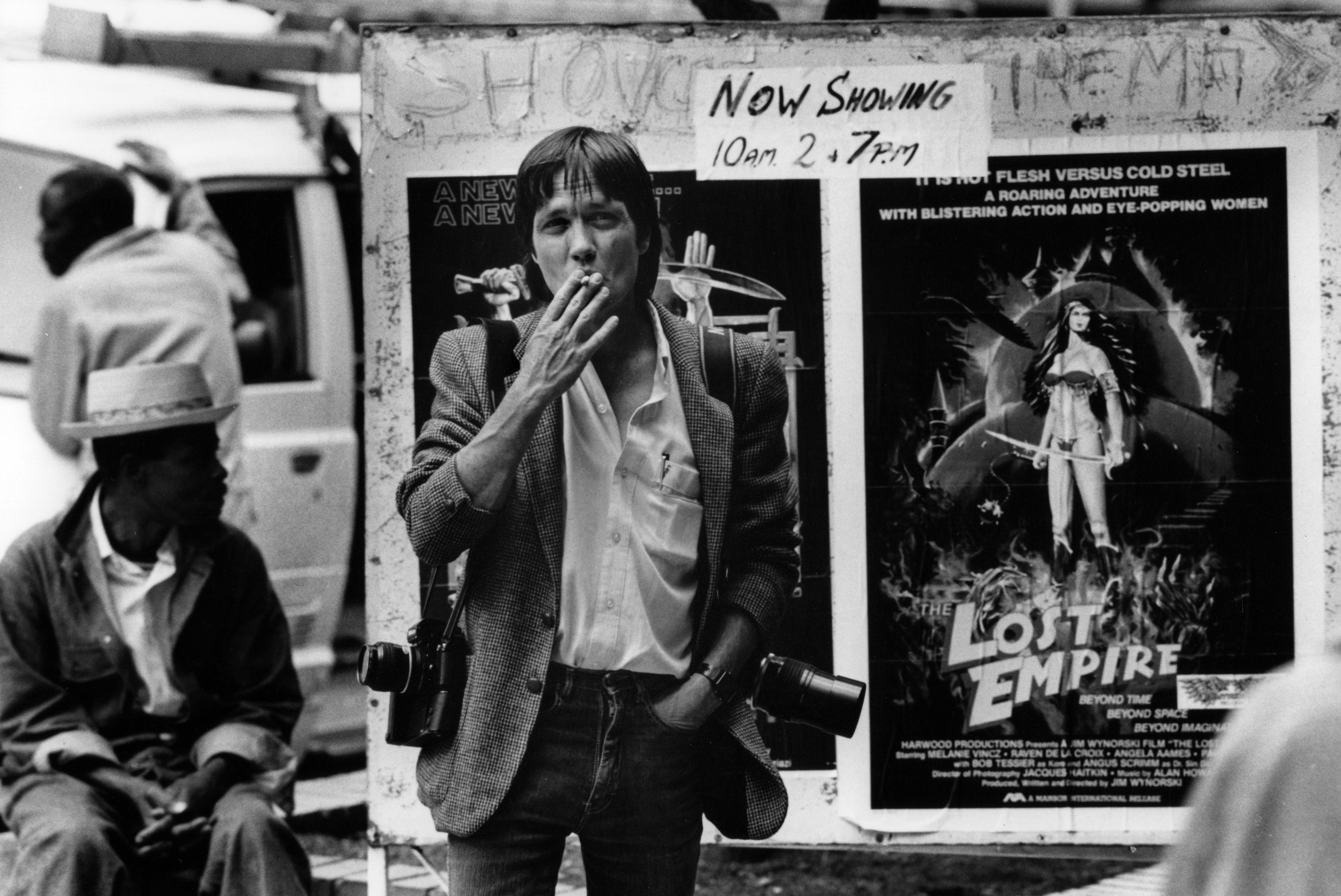
The ultimate street photographer, Les Bush, in the middle of Hillbrow, Johannesburg. (Photo: David Sandison)

A young Les Bush heading out on assignment for the Rand Daily Mail in the 1970s. (Photo: David Sandison)
I was the Johannesburg editor of this iconic men’s magazine for eight years, and would often be asked:
“Are you the guy who puts the stars on the nipples?”
I would cringe and stammer back, almost too precious for words:
“Um no, I write the stories in the magazine. The nipple stars happen in our Durban office.”
The minute I disassociated myself from the glamour girls and declared I was but a humble magazine hack, eyes would glaze over and the conversation would drift to the weather.
However, the freelance photographer I worked with most of the time was the short and fiery Les Bush, who relished the role of Scope Man. He knew the names and vital statistics of every Scope centrefold going right back to the mid-1960s, which endeared him to the world at large – except, of course, the odd Mother Grundy out there.
“You have to understand,” he explained to me on the cement porch of a cheap motel in North West one day. “If we were The Rolling Stones, I’d be Mick Jagger.”
“And who would I be?” I asked.
“Take your pick. Just not Mick,” replied the cheeky Bush. Funny, that. I would have figured him for the Keith Richards type.

Julienne du Toit and Les Bush strolling to his farm cottage in the eastern Free State. (Photo: Chris Marais)
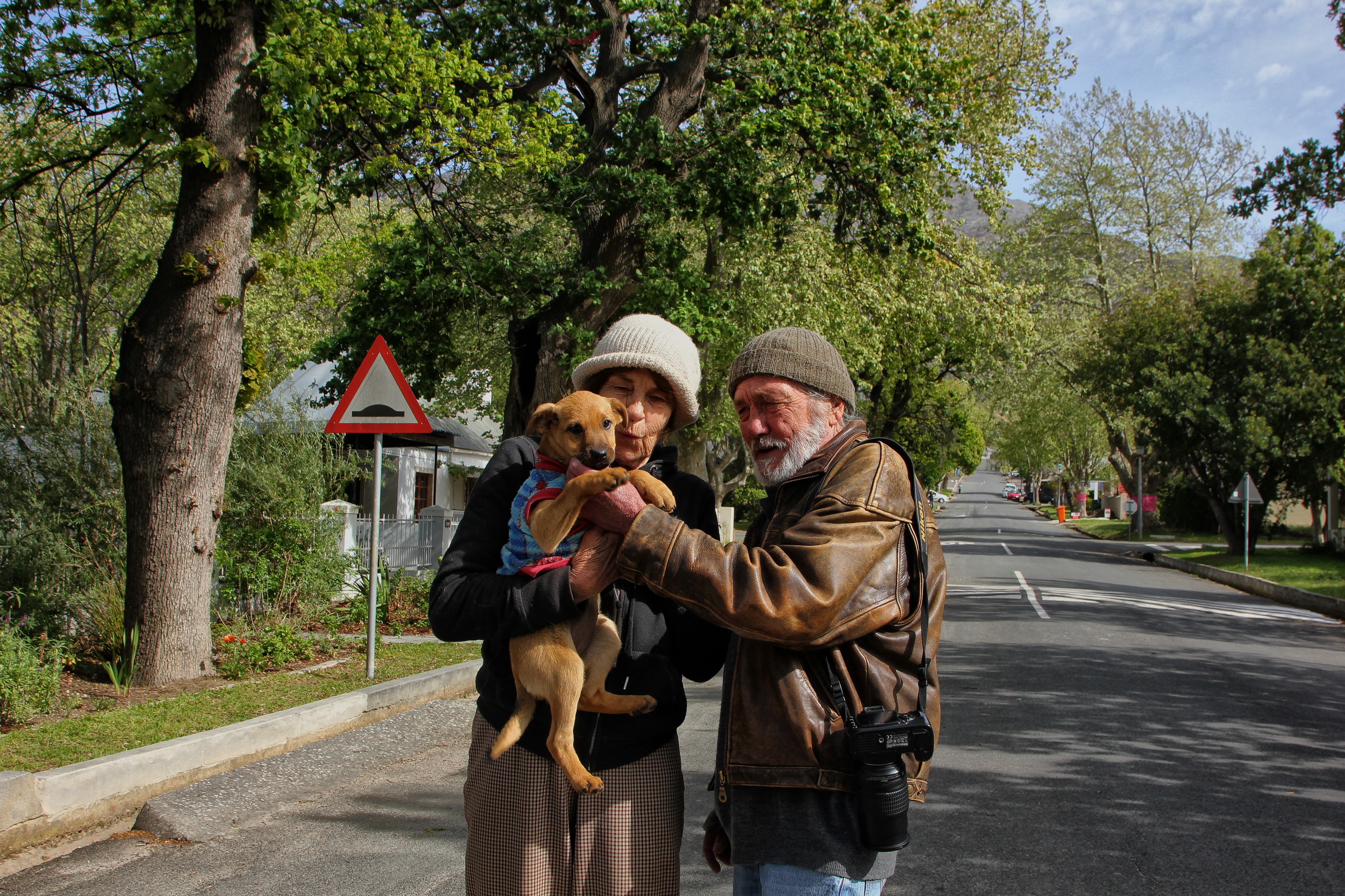
Admiring Villiersdorper Jenny Gird’s dog on an early-morning photo walk. (Photo: Chris Marais)
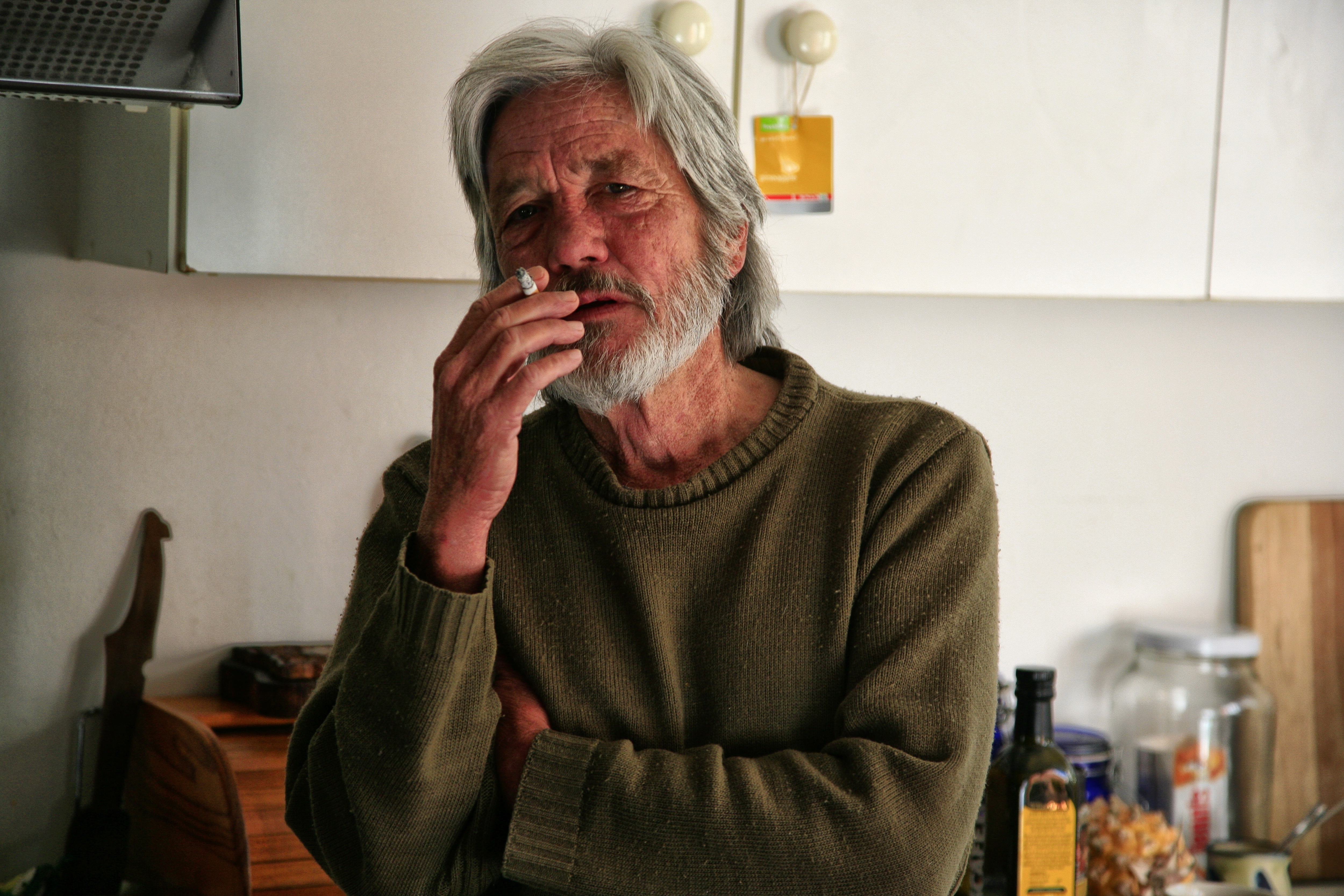
A mentor and friend to many famous photographers, Les Bush also had a wicked sense of humour. (Photo: Chris Marais)
The furry thing behind the bar
I tried to wreak a measure of revenge a few months later up in the ghost town of Leydsdorp near Tzaneen. Passing the open window of the deserted hotel bar, I saw, on the counter, the kind of object we old-school journos covet: a large metal spike. A spike you could stab hundreds of errant pieces of paper onto.
It hearkens back to the dinosaur days of manual typewriters, slide film, teletype machines and battle-hardened newsroom reporters. Your stories were typed out on low-quality A5 sheets of paper, three paragraphs a page. And if it did not meet the subeditor’s approval, it ended up on a large metal object simply called The Spike. So, to me, this lurking spike on the bar counter had great nostalgia value.
But just then I spotted something furry, black and fast in there, from the corner of my eye. No ways was I going to enter that place. But maybe old Les would, seeing as how he had no idea what lurked inside.
“Oh, Les, you’re smaller than me. Won’t you just dart into the bar through the window and grab me that old spike on the counter?”
Les obliged, and once inside I heard him curse loudly. Then he handed me the spike through the window.
“Thanks, Les. You’re a real pal. See anything else of interest in there?”
“Not really. Just something dark, fast and furry that hissed at me. But I cursed him back and he left.”
On the borderline
On another Scope assignment with Les, we head up to the northern town of Alldays to spend a week with the people who live on the borderline, which was a war zone in the 1980s.
I try to book us into the only hotel, but I can’t find my credit card. Turns out I left it on the bar counter at The Coconut Grove, near our new offices just off Louis Botha Avenue.
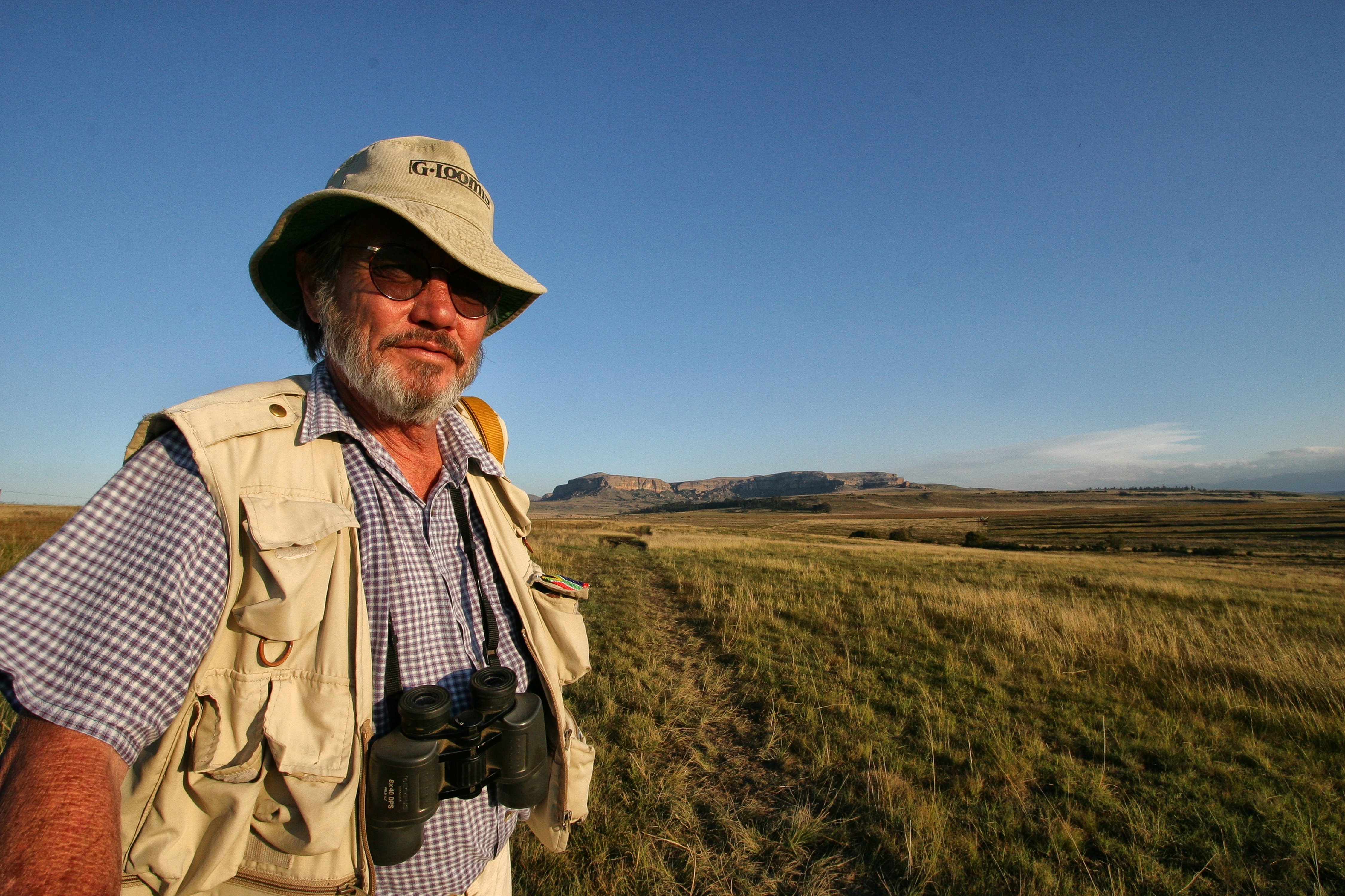
Birding in the Harrismith district before moving to Villiersdorp. (Photo: Chris Marais)
As I leave the public phone booth, a mobile porcupine that used to be a Citi Golf pulls up. Out steps a pompous pensioner who calls himself the Area Leader. He has come to check us out.
“I have the power to lock you up right here, Meneer. The aerials on my car? I can’t speak to you about that, it’s a sensitive matter. The mine developments in Alldays? I can’t speak about that, either. Sensitive, very sensitive. The security situation? The same.
“Now tell me what you want to write. I know you’re standing close to my car so you can listen to my radios.”
Les and I are amused by this encounter, but the more we smile the angrier the Area Leader becomes. The irate fellow reaches into his Citi Golf and pulls out an Uzi submachine gun, just to show us what’s what.
“We are prepared for anything. Even the hotel owner’s son is a corporal. He shifts the targets for us at the shooting range. I just want to warn the man who enters my area looking for trouble: just come, we are ready for you.”
In this moment, I realise he’s not really talking about insurgents from Zimbabwe. He’s all about putting the fear of God into us, Scope Magazine and the world of white urban liberals in general.
The local taxidermist sells Coca-Cola as well, so we cross the road in search of a cooling drink. Sugar for shock, as they used to say. Just then we see a wild-looking guy with a scraggly white beard and we recognise him instantly.
We immediately turn around and walk the other way.
The last time we saw this man of the road was at his camp along a river near Sabie in the east. All he had with him back then was a tired old knapsack, a fishing rod, a bait bucket and a two-litre Coke bottle full of water.
Les and I thought, hey, what a nice story. This aged hobo must have some interesting memories about life at the roadside. So we went over and introduced ourselves.

Still making magic with his camera after more than 50 years of photography. (Photo: Chris Marais)
“Go away or I’ll kill you where you stand!” said the guy, with the kind of quiet fury you really need to back away from.
But we just had to know why.
“You media are the devils who are ruining this land!” he shouted.
And with that, the old man lifted his fishing rod in a threatening manner and we drove off, seriously considering a change of careers.
The Slowhand comes to Swaziland
In the late 1980s, Eric Clapton came to play Swaziland (now Eswatini).
There are 120 of us in the Media Snake Pit just in front of the stage, all drinking and greeting and laughing while support act Joan Armatrading appears, plays three measly songs and leaves.
A very large American in a fancy baseball cap marches down to the centre point of the Snake Pit and tells the assembled media:
“That’s it! Everyone out!”
Nobody moves.
“I mean it, guys! Let’s move!”
We are frozen in time, space and the ludicrousness of this bellowed order. This just cannot be. Everyone in the Snake Pit is set to take the perfect Clapton in Concert shot. We cannot believe we have driven so far, drunk so much, expected such a good time, just to be sent away at the last minute.
“If you don’t clear out, he won’t play!”

Les Bush and his cattle dog Blue in the Harrismith farm days. (Photo: David Sandison)
Herman Potgieter, Ken Oosterbroek, Kevin Carter and a whole bunch of other once and future Kings of the Camera are down there, staring up at the flunky in disbelief. Les Bush breaks our silence. He points back at the baying crowd and shouts:
“Hey! You tell them he won’t play!”
The American bully’s bluff is called.
“I’m just a foot soldier around here,” he wheedles, this time with no exclamation marks. “I just follow orders. Now if you people won’t move, I’m going to have to move you.”
To which the bristling Bush replies:
“Hey, you! I’ve been standing up to the South African Police for the past 15 years. You’re nothing to me!”
Out of nowhere, Clapton’s tour boss comes on stage, tells the bully in the baseball cap to leave us be.
My grizzled little friend wins the day.
The freelance foray
I’m almost too embarrassed to share the next story with you, but the picture of Les Bush would be incomplete without it.
Although my salary wasn’t much to write home about, being a Scope writer meant a company car, expense account, paid-for accommodation on the road and all manner of little comforts and considerations along the way.
Les would always remind me that he was the hard-bitten freelancer while I was a bit of a pampered salaryman. So one time I took him up on that, booked a week off from Scope and organised a trip to the Eastern Transvaal (now Mpumalanga) to hunt with Les for stories we could sell freelance. How difficult could that be?
The prospect of a rich haul of features quickly turned into a week of leaking tent life, smelly wet socks, dodgy public facilities, cold showers, very cheap whisky and public telephones long broken. There was not a willing PR handmaiden in sight. No fluffy gift pack, Irish bed linen, free run of the minibar or complimentary imported chocolate heart on the pillow.
My old Renault wheezed its way through the very rainy Eastern Transvaal, with me working hard to keep my cold pickled fish breakfast down and Les Bush humming happily in the passenger seat.
I wanted mixed grills from corner cafes. Mr Bush said no, that’s for wussies. We do affordable road vittles’, like pickled fish straight from the tin. I hated road vittles, especially the affordable variety.
What’s more, every potential story lead crashed on us. A guy who used to own a fascinating nuclear bomb shelter outside Barberton was now a butcher. All he could offer us was a pork chop.
Wanting to interview the first female mayor of Sabie, we inadvertently walked into her empty office after working hours and set off an alert which nearly earned us prison time.
Bush the Birder
Some years later I went birding at Barberspan with Les, who was then a twitcher of note. Stand-out memory of that trip was Mr Bush approaching a dozing European Nightjar with his customary honeyed tongue:
“Show yourself or I’ll heave a half-brick at you.”
We went on to do a Country Life feature at Bothaville, the home of the humble mielie. The Maize Capital Forum welcomed us at the town museum with hot snacks and mid-morning moonshine.
“Here’s how you drink witblitz,” one of our hosts whispered to us while we were being officially welcomed and briefed.
“You down it, you put the glass on your head and you whistle a tune.” He gave us each a little bottle of 70% proof jet fuel to practise on.
The Forum lady making the speech was completely unflustered by the sight of two Country Life freelancers standing there with upside-down witblitz glasses on their heads, whistling Dixie Chicken by Little Feat.
“That’s very good, yes. I don’t really recognise the tune, but I can see you’ve had one or two shots of hard liquor before,” she said, and carried on with her presentation.
Down on the farm
And then suddenly, Les Bush disappeared from his usual Johannesburg haunts. We found him in the Harrismith area, minding a family holiday farm. He had an Australian cattle dog called Blue, spent his days stalking various bird species around the area and lived solo in a neat little cottage on one side of the farmstead. Nothing could persuade my friend to re-enter the fray of magazine journalism.

Mark Hansen, an old friend, Les Bush and the author. (Photo: Julienne du Toit)
That country sojourn lasted for more than six years, until the farm was sold and Les moved down to Villiersdorp. Initially a little lost back in “civilisation”, he befriended the owner of the Green Dragon pub, Indie Nuding, and became the establishment cook. The place was popular, partly because the food was good and the beer was cold. But the main reason people came regularly had to do with the hosting talents of Indie and Les.
And still, no camera was lifted in anger or otherwise.
But in 2013 when he discovered the wonders of Facebook, Les was taking photographs once more. A couple of years later, he began to promote Villiersdorp in earnest. His constant companion, his fellow “coddiwompler” who ferries him all around the region, is a local woman called Peggy Pagliari.
One of their major concerns is to report on the up-down status of Theewaterskloof Dam every week.
“Yes, Wednesday on the Villiersdorp Tourism Facebook page is Water Watch Day,” he says. “Mondays are Local is Lekker, Tuesdays are Downtown, Thursdays are Day Drives and Fridays are Weather Updates.”
Why does he do it?
“It’s given me a purpose again. I feel like I’m doing useful stuff, and I enjoy it. The page is doing very well, and the locals welcome us wherever we go.”
We walk into the Kelkiewyn Padstal for breakfast. It’s like being with a local celebrity.
“Hi Les,” grins the waitress. “Are you going to take my picture?”
Today, his colleague and friend David Sandison remembers: “Les was an exceptional photographer and a great man.
“There are few people who can come into your life and change it completely. Les was that person. And it’s hard to describe how big an influence Les was on me, my early working years and in fact my whole life.
“Not only as a photographer but in every way. He was mentor, teacher, entertainer, philosopher, passenger but mostly my great friend. We spent many hours in the darkroom, in my car, just hanging out in the garden, always setting the world right! I learnt so much from him.
“I’ve been living in London for almost 30 years now and although I only saw Les occasionally when I visited my folks in South Africa we had kept in touch from time to time by phone, email and more recently on Facebook and WhatsApp.
“The world is a poorer and less exciting place without him. I will miss him always.” DM
Les Bush died in Villiersdorp on Thursday, 6 July 2023.



















A wonderful memory of the author’s dear friend. Condolences, Chris!
Lovely feature Chris. It would have made Les really happy. I got my first dog from him, the runt of his litter. Every day for a week Les haunted me in The Argus newsroom, begging me to take his puppy. So I did – and she was my faithful friend for 15 years. What a total character Les was!
I noticed Les had slipped off FB, hamba kahle old soldier.